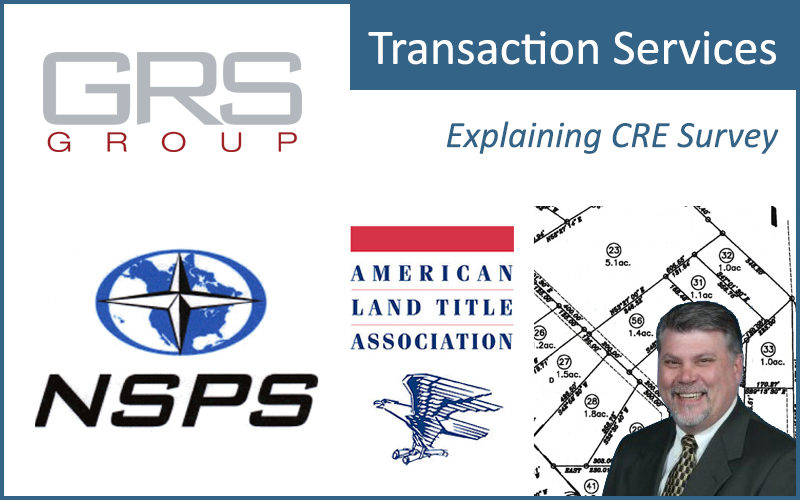
Kenneth Kuehm
Survey Operations Manager, GRS Group
(330) 779-1167
[email protected]
GRS Group recently brought on Kenneth Kuehm as Survey Operations Manager, a new position at the firm. He has more than 30 years of experience both at engineering and due-diligence firms, including 10 years in property management and has worked with both domestic and international commercial real estate clients of all sizes with a specialization in surveying services. Kuehm has overseen surveying teams and site condition reports to complete ALTA, MLS, and subdivision plats for a wide variety of property types. He took some time to tell us about his new surveying position at GRS and the changes he is seeing in this aspect of commercial real estate due diligence.
GRS Group: Go over some of the main responsibilities in your new position.
Kenneth Kuehm: I am reinforcing the asset portion of GRS Group, particularly for the survey work.
Once we get the authorization to proceed, I engage our surveying crews to perform the work in the quoted time period. A couple things we want to get from our clients at the beginning of the proposal phase is to make sure that we are getting the full content of their needs, whether that is an office survey, a subdivision plot, a boundary, a lead elevation certificate — we want to cover everything at one time for them.
At the same time, we want them to be able to share with us any documentation that they have because that will help give them more accuracy on the cost of the project. No client likes to be blindsided by an initial cost. That’s not to say that once we get the authorization to proceed: We get a title commitment that has more land in it, which was deposed and authorized and agreed upon, and we ask whether they want it done or not. Some clients might just want the survey done on a parcel of the land and not the whole lot. But they may bring in a lender who might want to increase the scope of work that needs to be done that wasn’t proposed the first time, like underground utilities.
Then we turn in the survey, and GRS Group and the client have comments. We do quality control checks on the survey, and once the project is done, we send out signed and sealed surveys. That’s one aspect of my position.
I am also reviewing all of the surveys to help our surveyors not get bogged down with the minutia of questions that can be answered by someone with my technical background, as opposed to a salesperson who might not know the ins and outs and how to read a survey or civil drawing in an easement document.
I also field calls from directors in our network when a client asks a question and the person in the field then calls me about a situation to see if its one of our capabilities, or if we can point them in the right direction. We are going to increase this platform with staff that will make the process go a little bit faster and smoother. We were doing things really well, but we are just trying to improve it and our brand name in this facet that GRS Group has taken hold of.
GRS Group: What do your past 30-plus years of experience in this field bring to the table at GRS Group, and how did you get involved in this line of work?
Kuehm: Prior to working at other due diligence firms, I worked at an engineering firm, and I have a background in engineering, construction, and civil work. My technical background helps suit their needs.
Every company has its nuances in how they manage and control the flow of products. It all boils down to having someone who has a background that can speak the language with a client and understand what they might need without bothering surveyors and taking up their time, not to say they’re not wanting to be asked, but it’s good to have a project manager with a technical background. In my past positions, I usually handled the tough projects, and I would help clients with their questions about the process.
GRS Group: Are you doing property type-specific work, or is it across the board?
Kuehm: Everything across the board. One good thing about a due diligence company is it’s not focused solely on one aspect of the construction field. What we aren’t focusing on right now is much government work because it can be difficult and very time-consuming. But at GRS, we do healthcare, education, seniors housing, multifamily, a subdivision with single homes, and all types of commercial work.
The one this that most varies across the United States is cost. New England states are very high compared to the lower Midwest states, for example. There is also timing and weather to take into consideration.
GRS Group: So, what has changed in due diligence survey sector over the last few years?
Kuehm: Years ago, firms just focused on one field, such as just housing or just healthcare. But I was focused on all of that at the engineering firm where I worked.
In 2007 and 2008, before the crash happened there was a lot of what I refer to as mom and pop firms. When the crash took place, it cleaned out a lot of those outfits. Now there are just a few firms handing all off the due diligence because they were already respected and had an in with the commercial real estate businesses. What I have seen change now is that there are a lot more companies out there thinking that they can do it, so the volume right now is what’s driving a lot of the costs. The bigger portfolio, the lower it’s going to cost per acre. It’s also about volume and turnaround time. Everybody wants everything done quickly. Near the end of the fiscal year, you see a lot of craziness going on. Then it happens again before the end of the calendar year with firms wanting to get deals done, so they can lock in interest rates. There are more due diligence firms in it than the level of size of their companies.
GRS Group: How do you see the commercial real estate industry holding up over the next 12 months? Any concern about a bubble?
Kuehm: We’re not headed for another bubble. There is awareness that the type of work that’s going to increase in volume is the smaller sales of properties. There are companies out there buying up these little commercial properties in groups and then selling them really fast. That hasn’t dropped off. They’re buying up vacant assets because they want to put something else in that spot and rebrand it.
With the larger work, there will be fewer car dealerships being done because there are so many selling the same product. Housing is coming back up, including subdivisions and multifamily. We’re getting older, too. We’ll probably go through another swing of healthcare properties being surveyed and retirement communities. Now there are so many different types of healthcare facilities. That sector will always be strong.
About GRS Group:
GRS Group is a leading provider of commercial real estate (“CRE”) services worldwide. With offices across the United States, Europe, and affiliates around the globe, GRS Group provides local market knowledge with a global perspective for institutional real estate investors, occupiers and lenders worldwide. The GRS Group team has evaluated and advised on over $1 trillion in CRE transactions.

